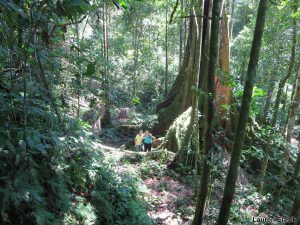Everyone’s experience in the Peace Corps is different, said Amanda Brinton, an Interdisciplinary Ecology graduate student. For Amanda, her experience in the jungles of Ecuador meant finding her passion for solid waste management.
Amanda is a Ph.D. candidate focusing her research on the recycling sector in Puerto Rico. Through her research, she is examining the effects of 2017 Hurricane Maria and government reorganization, specifically around solid waste management.
However, she has not always been passionate about solid waste management. It was her time in Ecuador with the Peace Corps that inspired her to pursue this issue.
Peace Corps
“I can’t even begin to explain how deeply that experience affected me,” Amanda said. “It truly changed me. As a human, how I perceive the world around me and how I interpret situations.”
Amanda said that during her time in Ecuador, the lush tropical jungle often juxtaposed with the smell of burning plastic and the sight of trash. She recalled a time when she was bathing in the river and trash was floating by her.

“When I was in the Peace Corps, I was in a small, rural, indigenous community,” Amanda said. “Even though we were not geographically an island, it was isolated in terms of access to municipal solid waste management.”
Some of her bigger projects in the Peace Corps included a plastic bottle recycling program as well as working with her community to secure rainwater catchment tanks for all 50 houses and a tree nursery in the community. She spent a lot of time working with children in schools, educating them about sustainability.
Through her experience in Peace Corps, Amanda became fascinated with the idea of how isolated communities manage waste. This experience altered her path from forestry and pushed her toward solid waste management.
School of Natural Resources and Environment
Now, she is completing her Ph.D. program in the School of Natural Resources and Environment, researching solid waste management in island nations and territories in the Caribbean. She is also a part of the UF International Center team as the Campus Recruiter for the Peace Corps. She said that she enjoys forming relationships and being a resource for those considering joining the Peace Corps.
Because of her professional and academic focus in the Caribbean, she has learned Haitian Creole as part of the Foreign Language and Area Studies Fellowship program through UF’s Center for Latin American Studies. Now, Amanda and her friend, July Nelson, who is also a Ph.D. candidate, have put together a 10-week pilot initiative called Haitian Creole in Higher Education Speaker Series Conversation Club. This club is open for all to join.
Before the Peace Corps
Amanda’s pursuit of her Ph.D. is not the first degree, or even the second, that she has earned from UF. Amanda completed her undergraduate degree in Natural Resource Conservation in 2009 and her master’s in the Master of Sustainable Development Practice in 2017.

She spent some time working with the Sierra Club after graduating with her undergraduate degree and worked as the community outreach coordinator for the Washington D.C. Chapter.
“Coming out of undergrad, I wanted to work in a research think tank,” Amanda said. “I never really thought about grass-roots advocacy, and I am so grateful that opportunity opened its doors. It led me down the path of community engagement in natural resources.”
Brazil

Amanda decided to move to Sao Paulo, Brazil, after her time in the Peace Corps. She lived there for six months to experience first-hand what community engagement in Brazil’s famous recycling cooperatives was like. She got involved with a weekly working group focusing on recycling efforts and learned about about recycling opportunities in Sao Paulo.
Amanda is passionate about making sure everyone feels like they can have a voice when it comes to solid waste management issues. She is taking a qualitative approach through her research to understand people’s perspectives on solid waste.
“Not enough people feel engaged in that conversation about how to handle solid waste, or even feel like they have the right to be speaking about solid waste management,” Amanda said. “I think it is really important that academia and professionals are really focused and motivated to tackle solid waste issues, not just when it is waste in a landfill. Everyone needs a seat at the table in that discussion. They need to feel welcome and empowered.”
 0
0
